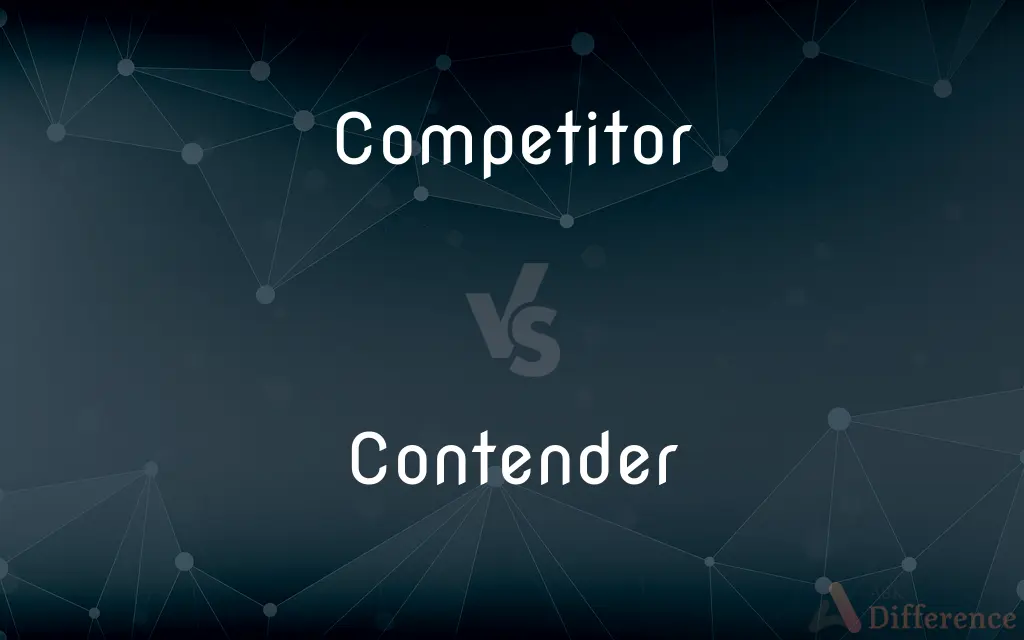Competitor vs. Contender — What's the Difference?
By Tayyaba Rehman & Urooj Arif — Updated on April 27, 2024
Competitor engages actively in competitions against others, aiming to win, while a contender can be a participant in any contest or competition, often seen as having a chance to win.

Difference Between Competitor and Contender
Table of Contents
ADVERTISEMENT
Key Differences
A competitor is someone who takes part in a competition or contest with the intention of winning or achieving superiority. While a contender is also a participant in a competition, the term often emphasizes the potential or capability to become a winner.
Competitors are typically seen in contexts where their direct engagement and rivalry with others are highlighted. Whereas contenders are usually discussed in terms of their qualifications or likelihood to succeed in a competitive scenario, even if they are not the current top competitors.
In sports, a competitor is any individual or team participating in a sport event, actively competing against others. On the other hand, a contender in sports often refers to someone who is considered capable of winning a championship or holding a title, regardless of their current ranking.
In business, a competitor is a company that sells or buys the same or similar products or services in the same market as another company. Whereas a contender might refer to a new or emerging company that has potential to disrupt the market with innovative strategies or products.
In the narrative context, a competitor is often portrayed as aggressive and highly focused on winning, while a contender is sometimes portrayed as an underdog or a rising star, adding a layer of emotional engagement in stories or discussions.
ADVERTISEMENT
Comparison Chart
Definition
An individual or group actively seeking to win
A participant viewed as potentially winning
Context of use
General competitions and direct rivalries
Specific scenarios where potential is emphasized
Connotation
Aggression and direct engagement
Potential and capability
Typical usage in sports
Any participant in a sporting event
A participant likely to win or challenge for titles
Typical usage in business
Companies in direct competition in a market
Emerging companies with potential to disrupt
Compare with Definitions
Competitor
A participant in a contest aimed at outperforming others.
Competitors in the chess tournament came from around the world.
Contender
A participant regarded as likely to win or succeed.
He is a strong contender for the scholarship.
Competitor
An entity involved in a struggle for supremacy.
As a competitor, the company sought to innovate faster than others.
Contender
Someone who exhibits potential in a competitive context.
The young actress is a contender for the award.
Competitor
A business rival in the same market.
Local competitors slashed their prices in response.
Contender
A new or emerging force in a particular field.
The startup is a contender in the technology sector.
Competitor
Someone contending for the same objective or award.
She was a fierce competitor in the debate competition.
Contender
An entity competing with a realistic chance of success.
With their new model, they are serious contenders in the market.
Competitor
An individual or team participating in a competition.
The competitors lined up for the race.
Contender
An underdog in a competition who shows promise.
Despite the odds, she remained a popular contender.
Competitor
One that competes with another, as in sports or business; a rival.
Contender
To strive in opposition or against difficulties; struggle
Armies contending for control of territory.
Had to contend with long lines at the airport.
Competitor
A person or organization against whom one is competing.
Contender
To strive in competition, as in a race; vie
Two runners contending for the lead.
Competitor
A participant in a competition, especially in athletics.
Contender
To strive in controversy or debate; dispute.
Competitor
(obsolete) Partner, associate, one working with another toward a common goal.
Contender
To assert or maintain
The defense contended that the evidence was inadmissible.
Competitor
One who seeks what another seeks, or claims what another claims; one who competes; a rival.
And can not brook competitors in love.
Contender
Someone who competes with one or more other people.
Competitor
An associate; a confederate.
Every hour more competitorsFlock to their aid, and still their power increaseth.
Contender
Someone who has a viable chance of winning a competition.
Competitor
The contestant you hope to defeat;
He had respect for his rivals
He wanted to know what the competition was doing
Contender
One who contends; a contestant.
Contender
The contestant you hope to defeat;
He had respect for his rivals
He wanted to know what the competition was doing
Common Curiosities
What defines a competitor?
A competitor is anyone or any entity that participates in a competition aiming to win or achieve superiority.
In what context might you prefer to use "contender"?
"Contender" is preferred when discussing someone's potential to succeed or when emphasizing their emerging status in a competitive field.
Can a contender be a non-human?
Yes, contenders can also be non-human, such as sports teams, products, or companies in the context of having potential to succeed.
Can a contender also be a competitor?
Yes, a contender can be a competitor, especially if they actively participate and strive to win in a competition.
What is the emotional connotation of "competitor"?
"Competitor" connotes aggression, determination, and active engagement in competition.
How is "competitor" used in sports?
"Competitor" is used broadly in sports for anyone participating in a competition, regardless of their potential to win.
How does a contender differ from a competitor?
A contender is seen as having the potential or capability to win, often without currently being the top competitor.
What is the emotional connotation of "contender"?
"Contender" often carries a connotation of hope, potential, and sometimes being an underdog.
What makes someone a strong contender?
Strong contenders are characterized by their capabilities, potential for success, and sometimes their innovative approaches.
How is "contender" used in sports?
In sports, "contender" often refers to an athlete or team seen as capable of winning titles or championships.
Can a competitor be a non-human?
Yes, in various contexts like technology or sports, non-human entities like teams, products, or companies can be competitors.
How do businesses use the term "competitor"?
Businesses use "competitor" to describe other companies that offer similar products or services in the same market.
What qualities typify a competitor?
Competitors are typically aggressive, strategically focused, and determined to outperform others.
Is "contender" a positive or negative term?
"Contender" is generally a positive term, highlighting the promise and potential of an individual or entity.
Share Your Discovery

Previous Comparison
Plot vs. Scheme
Next Comparison
Implement vs. ToolAuthor Spotlight
Written by
Tayyaba RehmanTayyaba Rehman is a distinguished writer, currently serving as a primary contributor to askdifference.com. As a researcher in semantics and etymology, Tayyaba's passion for the complexity of languages and their distinctions has found a perfect home on the platform. Tayyaba delves into the intricacies of language, distinguishing between commonly confused words and phrases, thereby providing clarity for readers worldwide.
Co-written by
Urooj ArifUrooj is a skilled content writer at Ask Difference, known for her exceptional ability to simplify complex topics into engaging and informative content. With a passion for research and a flair for clear, concise writing, she consistently delivers articles that resonate with our diverse audience.












































